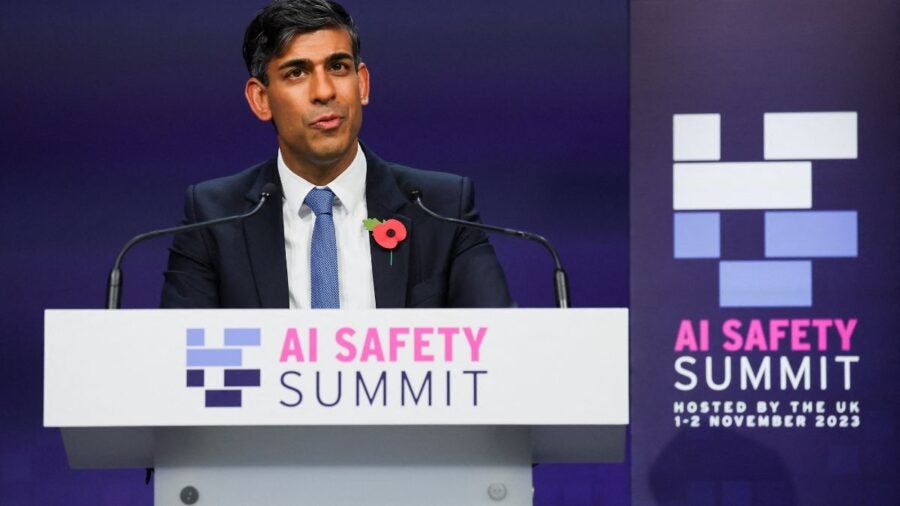
For centuries, purveyors of science fiction have warned of the threats posed by artificial intelligence. From Frankenstein through to The Matrix, many works envisaging a dystopian future depict humanity’s struggle to deal with various forms of AI.
But this idea is no longer a mere flight of sci-fi fancy. Fast-developing AI-based tech has started affecting people’s lives – especially their work – in a very real way.
The UK government recognises the risks presented by AI’s rapid advance. This week, at Bletchley Park, it hosted the first AI Safety Summit, a two-day assembly of political representatives from 28 countries, along with senior figures from business and academia.
The so-called Bletchley declaration, a document signed on day one by every government represented at this convention, marks a rare point of international consensus. It outlines an agreement for the countries to cooperate on AI research and regulation.
Although the declaration is light on policy goals – those will, presumably, follow in a second summit due to be held in South Korea in six months and a third in France in 12 – it can still be seen as a diplomatic achievement.
Getting the right people in the same room
The fact that, among others, China, India, the US, the UK and Saudi Arabia have agreed to share knowledge and develop international standards would seem to be a positive sign for the private sector. While they’re wary of the risks attached to AI, businesses are naturally excited by its potential to streamline or otherwise enhance their operations.
Summit attendee Julian David, CEO of trade body techUK, believes that the government’s decision to invite businesses, including Microsoft, Google and Samsung, was “only right, because they should have a voice on the issues that will affect them. The key thing for this summit is that it’s the first one and others will follow.”
Charlie Thompson, senior vice-president, EMEA, at software company Appian, agrees but suggests that subsequent events should be more inclusive. “There are many other viewpoints that need to be heard,” he argues. “What about the smaller firms and startups that are also making headway in this space with apps and platforms? What about consumers whose lives will be affected by AI?”
Regulation should not stifle innovation
The AI Safety Summit seemed largely concerned with identifying all the key risks presented by AI. Managing these effectively will require governments to strike “the right balance between appropriate regulation while still enabling innovation”, according to Thompson.
In David’s view, legislators and regulators should concentrate on addressing safety and security concerns. For instance, governments should work particularly hard to prevent the proliferation of “fake news and people impersonating people” using AI, he stresses, adding that they need to maintain a strong focus on ensuring “traceability and accountability”.
David doesn’t believe that governments should go so far as to impose higher tax burdens on firms with large AI footprints, for example. “It seems unfair to pick on one particular technology,” he argues. “We still want companies to be researching and developing AI – and we want the UK to be competitive in this space.”
But David does think that the government could incentivise employers to retrain and redeploy their staff. The end goal, he says, should be to create a regulatory framework that encourages businesses to “create more jobs with AI than they replace”.
What happens next?
The summit concluded that harms caused by AI, whether deliberate or accidental, can take many forms. To address this and other problems, an international task force comprising politicians, technologists and business leaders could be in place early next year.
It’s clearly unreasonable to expect a fully formed, effective international governance framework to come off the back of one inaugural conference, but that’s surely the ultimate goal that future summits will be working towards.
AI is here to stay, so businesses must get to grips with it. The technology has the potential to be transformative, but it needs to be handled with care even before the law-makers get around to making this mandatory.

For centuries, purveyors of science fiction have warned of the threats posed by artificial intelligence. From Frankenstein through to The Matrix, many works envisaging a dystopian future depict humanity’s struggle to deal with various forms of AI.
But this idea is no longer a mere flight of sci-fi fancy. Fast-developing AI-based tech has started affecting people’s lives – especially their work – in a very real way.
The UK government recognises the risks presented by AI’s rapid advance. This week, at Bletchley Park, it hosted the first AI Safety Summit, a two-day assembly of political representatives from 28 countries, along with senior figures from business and academia.
